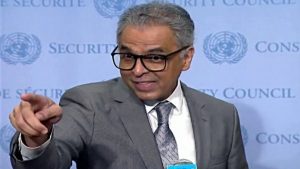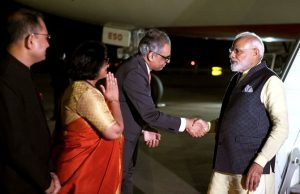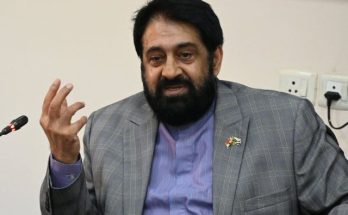Diplomat extraordinaire and an ardent advocate of India’s enhanced role on the global stage, Syed Akbaruddin has represented the Asian country of 1.3 billion people at the United Nations with poise and panache. As India’s Permanent Representative to the UN, Akbar, as he is called fondly by his friends and associates, played a pivotal role in getting 26/11 mastermind Masood Azhar proscribed as an international terrorist and astutely countered the diplomatic campaign led by China to raise the Kashmir issue at the UNSC after the change in its constitutional status in August last year. On April 30, Mr Akbaruddin retires from the Indian Foreign Service, after a distinguished diplomatic career, spanning decades, which included stints as the spokesperson of India’s Ministry of External Affairs and Chief Coordinator, India-Africa Forum Summit III. With his typical flair, on his last day in office Syed Akbaruddin greeted UN Secretary-General Antonio Guterres via video conferencing with a `Namaste,’ which was warmly reciprocated by the UN chief.
In this wide-ranging conversation with Manish Chand, Editor-in-Chief, India and World magazine and India Writes Network, Syed Akbaruddin spoke from his office in New York about India’s role in the post-pandemic world order, the country’s initiatives to keep counter-terrorism high on the global agenda and innovative India-led initiatives to create a new paradigm of reformed multilateralism.
Excerpts from the interview
Q) What do you think of India’s role in the UN to advance global cooperation in combating the pandemic? How do you look at India’s role in the post-pandemic world order?
A) The global pandemic has shown the inadequacies of the current mechanisms of global governance. They seem to be in need of retooling to be fit for purpose for our times.
India has even in such an unprecedented international situation shown ability to work cooperatively for global public good. Any situation that evolves from the experiences of the current circumstances will necessarily take into account the value of those who stood up, when needed .
Addressing a global pandemic requires mobilizing of an array of resources and skill sets within and beyond national borders at multiple levels. Even as we have addressed challenges at home we are actively engaged in multiple efforts at regional (South Asia), plurilateral (G/20) multilateral (NAM) levels. These encompass medicines and much more.

Q. India has been mobilising the international community against terrorism and has been pushing for CCIT for many years. Prime Minister Modi has also called for a global conference on terrorism. But for all our concerted efforts to mobilise the international community, one recalcitrant country hasn’t stopped practising cross-border terror against India. What are we doing to pressure Pakistan on the issue of terror at UN?
A) In terms of international diplomacy, terrorism has a special salience because very few diplomatic issues impact the lives of ordinary people as does terrorism. And therefore, it has a resonance way beyond what you and I may think as diplomats. That said, for countries like us, this would be always be a key issue to pursue.
While the global convention or the Comprehensive Convention on International Terrorism (CCIT) hasn’t taken place yet, norms and actions to counter terrorism at multilateral fora have grown exponentially. There are several Security Council resolutions which have tried to plug gaps in the counter-terrorism agenda. I think there has been tremendous progress in the area of global counter-terrorism efforts. The progress is largely through the Security Council because the more normative organisation of the UN, the UN General Assembly, has not been able to move for reasons that you pointed out. But that hasn’t stemmed the tide of efforts to counter terrorism. We are now moving into a different era, and that is the use of cyber space and internet to incite terror and to promote terror. There are enormous implications of this new trend for ordinary people across boundaries.
If the UN-affiliated organs do not address the issue of terrorism, there will be coalitions of the willing who would address this because this is too serious an issue to be left alone. We hope that we can address it multilaterally. If we can’t, we, as India, will continue to plough the furrow and ensure that there will be groups of friends who can work together and that’s where the conferences and other meetings come together because we cannot wait indefinitely for everybody to be on board on an issue of life and death. Whatever it takes, we will continue to pursue this agenda because it is an agenda of utmost urgency.
India, a Bridge-Builder
Q: You have spoken about India’s rising global stature and the kind of attention, diplomatic and otherwise, which India merits. How do you look at India’s leadership role? How do you look at the world’s expectation of India, in terms of setting the agenda? At one point, we were seen as nay-sayers and now we are setting the agenda. This a very radical, transformative change.
A: If you look at it, the world is in a situation of great volatility — there are very few countries who are able to straddle that volatility because there are people who can either be with the West or with the East, with the North or with the South. But there are very few countries who have the capacity to transcend these things and bring everybody to the table.
India’s USP here is that we are able to do that. And I’ll give you just two examples in the recent past, how we have been able to do that — where we’ve crossed the traditional fault-lines. And these are symptomatic of what will happen in the future. For example, the International Solar Alliance. It brings together France on the one hand, Australia on the other hand, and a diverse array of smaller states who can benefit from the use of solar energy. This kind of initiative breaks down the divide of developed versus developing countries, and it brings to the table a coalition of interested parties or countries wanting to benefit from an issue-based interest, which is also of a developmental nature. This is unique because it changes the dynamic that exists today. The US versus China, or Russia versus the US — it brings to the table a very different mix and a very different solution.
In a similar vein, Prime Minister (Modi) has announced Coalition for the Disaster-Resilient Infrastructure (CDRI). Again, it has very similar goals but it brings to the table a different set of factors. What are these goals? Increasingly, climate change is causing havoc of a nature which we did not foresee in the past and therefore infrastructure damage is a major, concern for most countries, especially for those who are in the category of least-developed or developing because one hurricane or cyclone can put you back by decades. Building better and re-building better is therefore the goal on which countries can work together. It’s an issue-based coalition which is looking at a development-related issue, which is bringing to the table people who can help with technical skills and finance. Going forward, we can look at such examples in multiplicity of areas.
Today, we are focused on areas of development but tomorrow it could be in areas of humanitarian relief. Looking ahead, that’s how we are expanding our engagement; we are willing to look issue by issue in a very pragmatic manner, of bringing to the table a diverse array of actors. It’s a difficult phase in global international diplomacy because today the cleavages are so sharp that there is no movement possible unless you straddle those differences.
Q) This is a very different world right now and the multilateral order is under siege, so to speak. Unilateral tendencies are rising across the spectrum, fracturing consensus on many issues. In this context, how do you look at India’s role in upholding and espousing the rules-based multilateralism? PM Modi, for example, has been speaking about Reformed Multilateralism.

A) The volatility in the international system has clearly impacted the current multilateral order. We are already in turbulent times, if I may say so. This sort of turbulence has not been seen since the second world war period. Even during the Cold War this kind of turbulence was not there. So obviously it’s a reflection of reordering of the world that is going on. That re-ordering is essentially not a bad thing for countries like us who have been aspiring to have a better place in the world order. And, therefore, we feel that the re-ordering is necessary and it will impact the multilateral order.
India is advocating reformed multilateralism as we believe that the multilateralism, as we have today, will have to adjust to new realities. It will have to have a future vision, which is different from the past, and only then will it be able to gather steam again.
Author Profile

- Manish Chand is Founder and Editor-in-Chief of India Writes Network (www.indiawrites.org) and India and World, a pioneering magazine focused on international affairs. He is CEO, Centre for Global India Insights, an India-based think tank focused on global affairs.
Latest entries
 India and the WorldFebruary 17, 2026South-by-South: Focus on people-centric solutions at India AI summit
India and the WorldFebruary 17, 2026South-by-South: Focus on people-centric solutions at India AI summit India and the WorldFebruary 7, 2026Modi hails interim India-US trade deal, Goyal says no concessions made on agriculture
India and the WorldFebruary 7, 2026Modi hails interim India-US trade deal, Goyal says no concessions made on agriculture India and the WorldFebruary 2, 2026Trump announces trade deal with India, Modi ‘delighted’
India and the WorldFebruary 2, 2026Trump announces trade deal with India, Modi ‘delighted’ India and the WorldJanuary 31, 2026Palestinian minister bats for mediatory role for India in ending Gaza conflict
India and the WorldJanuary 31, 2026Palestinian minister bats for mediatory role for India in ending Gaza conflict








